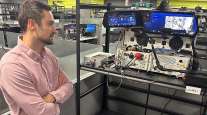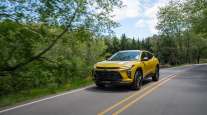The Detroit News
GM’s Detroit-Hamtramck Plant Will Build Cruise Origin Self-Driving Shuttle

[Stay on top of transportation news: Get TTNews in your inbox.]
Detroit — General Motors Co. is expected to announce on Jan. 27 plans to build the all-electric Cruise Origin self-driving shuttle at the Detroit-Hamtramck Assembly plant, according to two sources familiar with the matter.
The Origin, developed by Cruise, the autonomous-vehicle unit of GM, was created in partnership with Honda Motor Co. Unveiled in San Francisco on Jan. 21, it’s a boxy vehicle with no steering wheel or gas pedal that’s intended to be used in a ride-sharing fleet. It is powered by a new all-electric platform built by GM.
At the Jan. 21 event, Cruise CEO Dan Ammann said a production announcement would be made in coming days.
In part one of a two-part exploration of autonomous technology today, our latest RoadSigns podcast revisits conversations with CEOs Alex Rodrigues of Embark and Cetin Mericli of Locomation. Hear them explain what testing automated trucks and developing platooning technology has taught them about the road ahead — and get new perspective with host commentary. Listen to a snippet from Rodrigues above, and to hear the full episode, go to RoadSigns.TTNews.com.
The Cruise Origin autonomous vehicle is alluded to in a letter sent to employees on Jan. 24 by Gerald Johnson, executive vice president of global manufacturing for GM. It also confirms that electric pickup trucks will be built at the plant.
“I am pleased to announce officially that General Motors will be investing $2.2 billion in our all-electric future at the Detroit-Hamtramck plant for electric pickups, SUVs and AVs [autonomous vehicles],” the letter reads. “Electric pickup production will begin in late 2021, creating more than 2,200 U.S. Manufacturing jobs.”
The automaker’s announcement solidifies GM’s hometown as the hub for its next generation of vehicles and is part of GM’s strategy of a future with zero crashes, zero emissions and zero congestion. The automaker plans to release 20 electric nameplates by 2023.
There’s been intense interest in what products are planned for the plant that GM was going to close in January 2020, but then agreed to keep it open during talks with the United Auto Workers union last fall.
Current production of the Chevrolet Impala and Cadillac CT6 at Detroit-Hamtramck will cease at the end of February and the plant will be retooled for an electric lineup that is said to include the return of Hummer vehicles branded under GMC, as well an electric GMC Sierra and Cadillac Escalade. Retooling is expected to take 12-18 months, according to a chairman’s report from UAW Local 22 at the Detroit-Hamtramck plant that was obtained by The News.
The automaker is expected to air a Super Bowl commercial featuring Lebron James and the first product expected to come out of the plant in late 2021: an electric version of a Hummer truck and SUV. GM purchased the Hummer brand in 1999 and discontinued it in 2010 following its bankruptcy. It failed to close on a deal to sell the brand to a Chinese manufacturer.
Earlier this week, GM reached an agreement with Michigan to reduce and cap tax breaks as part of a deal that will require the automaker to invest $3.5 billion in the state in the next 10 years, including at its Detroit-Hamtramck Assembly plant. Under the agreement announced Jan. 22 by the Michigan Strategic Fund board, the value of the GM’s maximum tax credit will be reduced by $325 million to about $2.28 billion.
GM’s investments in the Motor City are central to the future of the automotive industry and follow other recent announcements by automakers.
Ford Motor Co. is investing $740 million to renovate a historic site in Corktown and develop future technologies there. Fiat Chrysler Automobiles NV earmarked $2.5 billion to retool two plants in Detroit to build next-generation Jeep SUVs and, eventually, electric vehicles. And Waymo, the self-driving unit of Google parent Alphabet Inc. is investing $14 million to outfit vehicles with its autonomous technology at a former American Axle & Manufacturing plant in the city.
Want more news? Listen to today's daily briefing:





